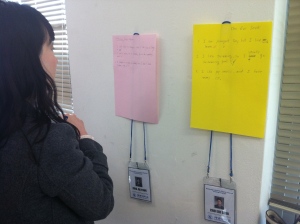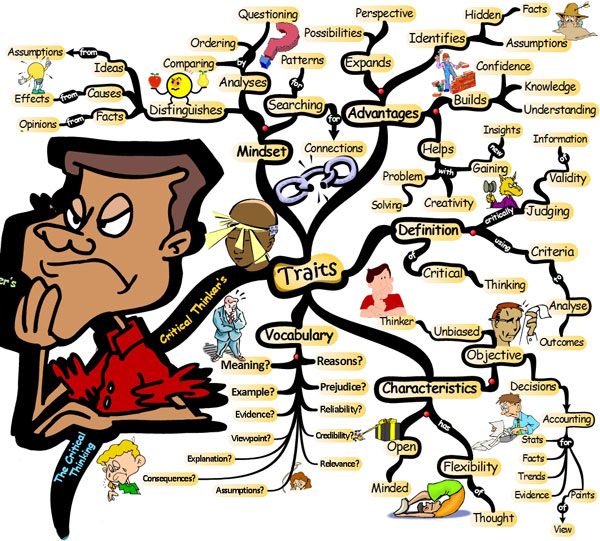A past teacher-trainee (participant) of mine wrote this Chinese proverb (see title) as her Facebook status yesterday. I am grateful to Youkyung for posting this — not only because she gave me a title for this entry — but also because she reminded me that many other teachers share this teaching belief: we learn from our experiences. Why did I need this reminder? Well, it has to do with a question a participant asked me during yesterday’s class focused on reflective learning: he questioned the purpose behind reflective writing. I realized two points from his simple question, and I’ll begin my reflective quest from the observation stage of the experiential learning cycle.
(click here to see a fun flash depiction of the cycle)
Kolb’s experiential learning cycle. Graphic by Clara Davies/Tony Lowe, Leeds University LDU/SSDU.
Reflective Observation – What?
A significant moment always begins as a concrete experience. My significant moment has a background story. Here it is:
Yesterday was the fourth writing lesson of the semester. During the first class of the week (lesson plan 2), I asked the participants to do the 2 Truths & 1 Lie ice-breaker activity. The catch was that in order to make their truths and lies, they would have to use either of the conjunctions or, so, but or and. They then wrote their sentences on a sheet of paper, and posted them all over the classroom for a gallery walk. During the gallery walk they circled the sentence they thought was a lie for each participant. Once this was done, they each presented their truths and lies, and in this way, we got a little glimpse of their lives.
From this point we went into a lesson on the use of conjunctions and their relationship with commas. Wanting to avoid a lecture on these punctuation rules (see inductive approach), I asked the participants to scan an article for FANBOYS, and then in pairs they compared sentences that combined comma with conjunctions, and those that didn’t. They came up with their own hypothesis for these rules, and then I gave them an explanation
The next day (lesson plan 3), after asking them for some basic feedback on their interests and concerns for my writing course, we reviewed the comma/conjunction rules. I then asked them to take out their Truth & Lie sentences to edit them according to what they learned. They also added 3-5 sentences to one of the sentences they wrote, elaborating their story, and practiced the new rules. After peer checking their work, I did my best to offer one-to-one feedback.
Now back to yesterday. My plan was for the participants to reflect on the week’s previous two lessons in a reflective writing activity. To help them remember what they did, we reviewed the week’s lessons. I then I wrote this on the board:
Choose one significant moment/event that happened this week in writing class. Describe this event. The event could be related to learning or teaching.
We had a whole class discussion about the definition of the word significant. We concluded that it can be something important and meaningful, and that it is neither good nor bad; it is simply something that strikes us as a point of exploration.
In pairs they discussed their significant moment. Once they were done they described their significant moment (reflective observation) in writing. After that they answered:
Why was this moment significant for you? (abstract conceptualization).
I explained that at this point they could explore their feelings and ideas behind the event.
The final point of reflection focused on this:
Explain how this will impact your studies in this program, your future role as a language learner, or your future role as a language teacher. (Active experimentation)
While they wrote I saw some eyes roll and heard some hesitant sighs. One of my participants asked me what this activity was helping them practice: fluency or accuracy? I told him that this isn’t a writing activity focused on fluency or accuracy. It is an activity focused on helping them learn. I saw confusion in his eyes. This was my significant moment.
Abstract Conceptualization – So what?
Why did I ask them to do all this reflection? I wanted them to do this because I believe learning happens once it is reflected upon. This is such a strong teaching belief for me. Without reflection, a learning moment risks getting lost in the content of the day or week. While we reflect on a moment, we unlock realizations that we may not have been able to make conscious otherwise. Reflection brings the learner back to understanding his/her involvement in an experience. This is what the Chinese proverb reminds me of. So by looking back on their week, and by writing about one moment that impacted them, I believed that their writing would help them integrate this learning.
But what the participant helped me realize was that there is another purpose to reflective writing that I had not made explicit. What was this reflective writing helping them practice? From a skills perspective, this is an activity that asks them to work with their thinking skills. Via his simple inquiry, and through my own reflection, I realized that reflective writing will do more than help them learn from their experience. From their writing they will learn to develop their ability to be critical and creative thinkers. These are essential skills for all writers. These are skills that help the writer create content and meaning.
Active Experimentation – Now what?
I began this entry thinking I was going to write about the importance of reflective writing. I thought I was going to validate my belief that reflection is essential for learning, and that by asking them to reflect I was increasing their learning. After yesterday’s class I had a small doubt that the participants would also be able to understand this value. I was worried that they would somehow rebel against the idea of reflective writing because they wouldn’t be able to see a clear link to the traditional 4 skills. I wondered how I would help them understand that learning is the ultimate goal, and that how we learn isn’t only via tests, but also via experience and reflection on experience. I thought that by writing this entry, and by reflecting on my week’s lessons, I would justify my belief that teachers need to understand that learning is the most important outcome for their students.
I still believe this, and will also teach my participants from this point of view when I ask them to write reflectively. However, now I realize that I can also come to reflective writing from a different perspective. I can help participants understand that reflective writing will also help them be better writers thanks to their developed thinking skills. At a time when the content of the Korean standardized achievement tests will be asking their students to be more critical, these are essential skills for their teachers to develop and understand. So in the end, I learned that reflective writing is a way to develop language skills, as well as to help increase their learning.
I’ve learned a lot from my participant’s question, and without reflection I may not have come to this realization. His question helped me realize that even our most fundamental beliefs should be questioned. From this realization, I believe we can add another element to the ancient proverb:
Tell me and I forget; show me and I remember; involve me and I understand; question me and I become aware.





Hello! I love this quote, it’s on my business cards. Did you know it’s originally Confucius but Benjamin Franklin has a claim to it too! He said:
Tell me and I forget. Teach me and I remember. Involve me and I learn.
Read more: http://www.brainyquote.com/quotes/keywords/learn.html#ixzz1mLEIsDD5
BTW Thanks for following my infant blog, that’s very encouraging!
LikeLike
Thank you for that information! I have seen both versions and often wonder if they sometimes get mixed up :)
You’re welcome! I’m happy to see another teacher/blogger on WordPress and Twitter who shares similar beliefs! Happy blogging!
LikeLike
Honestly, it was mostly just the title that stayed in my head, like a mantra. But also when you taught about commas, letting them try to figure it out a little, then explaining.
Most of my classes are supper basic phonics and listen and repeat “This is a red pencil” kind of stuff, but the last class is getting more advanced. Instead of just telling them how it is, I showed them how to get the answer on their own. Even just getting them to understand short vowels, long vowels, and double consonants, when I got them to figure out which one it was on their own, I could see how great they felt!
LikeLike
Isn’t that a great feeling? Thank you for sharing this experience Joseph. No matter how complex or simple those “ah-ha” moments may be, they are so important to celebrate. It’s a win-win situation for the student and the teacher. I look forward to hearing more about how discovery plays out in your classroom.
LikeLike
This really inspired me in class today. On a much simpler scale than what you’re doing, of course, but it made me pay more attention to watch for that point where you see it click and their eyes light up. Thank you!
LikeLike
Thanks for reading and the comment Joseph! I love knowing that despite the fact that we teach in different contexts that we can still find inspiration and connection. Teaching is teaching. I’d like to know what you read in the blog that made you think about paying attention. It would help me connect to your experience even more :)
LikeLike
Hey Josette,
As you might imagine I am really enjoying the exchange! I have had experiences (actually in the very same city as you!) where I thought I was there to do teacher training but the participants thought they were there for an English class. I think it can be a delicate balance. I really enjoyed trying to find a balance that worked for everyone. I enjoyed situations were “teaching English” could be the content and they could happily get chances to practice/improve their English.
Getting off track for a brief moment, I sometimes felt that there were tons of lost opportunities for more “controlled practice” and feedback on language issues when the courses were entirely focused on teacher-training (and not language development at all).
As for my question, “How much reflection do you think is helpful/necessary for (non-teacher) English students in an English class?” I really don’t know! I think that reflection could be one type of review but I also think that there are various ways to review. I, as you know, highly value reflection in teacher development but I might be a bit worried about forcing it students who are just interested in verbs and nouns or whatever.
I am trying to imagine what “rigorously” going through the ELC might look like in “just” an English class.
I can imagine students “finding the gap” after doing an activity and realizing that they don’t have sufficient language to perform at the level that they want to. I can imagine action points related to focusing more on certain linguistic areas the next day or making a point to use X amount of present perfect (or whatever) sentences the next class.
I guess I am sort of talking myself into it here!
Now I am very pleased that I asked the initial question because your response really got me thinking!
LikeLike
Great ideas! Thank you for posting them! I can see a presentation on this topic somewhere down the road. What do you think?
LikeLike
I really enjoyed reading this Josette! I loved how your thoughts are mixed in as a nice example of the ELC.
The question that came to mind as I read this fascinating entry was what role the student/participant is expecting in the class. Is he expecting “just” an English class? Is he expecting a training course? Is he expecting a training course were he can simply collect tricks and activities?
My follow-on (and sincere) question is “How much reflection do you think is helpful/necessary for (non-teacher) English students in an English class?”
cheers,
Mike
LikeLike
Loved the questions Mike! They made me reflect even more on the situation.
Because our training course is also set up as a language skills course, trainees come thinking they are mainly going to focus on their language skills. However, they don’t really consider the content/theme of the course. Since I teach a writing course, I see it as a perfect opportunity to ask the trainees to reflect on subjects such as teaching and learning. They do can this while they learn how to structure essays and paragraphs. Because of the nature of our schedule, we have limited time to focus on the actual “how to teach/how to learn” part of our training course, so I want to combine this element to the skills class. In a sense it becomes a content-based skills class with teaching and learning as the content. This is also how I’ve managed to work with the trainees who are interested in exploring their teaching in more depth. I realize that this isn’t the case for all the teachers. Some are coming to the program looking for a retreat, or as you say as “just” an English class. Being asked to reflect on learning then becomes a strange new foreign language learning experience. This is the perfect segue into your last question, and my answer is that it depends on your students and the context. I see reflection as a form of review, and as a language learner myself, I need review at least once a week in order to really internalize the language. Depending on the skill being learned, reflection could be in writing or via discussion. In an ideal world, reflection/review would happen during each lesson. How would you respond to your question?
Many thanks,
Josette
LikeLiked by 1 person